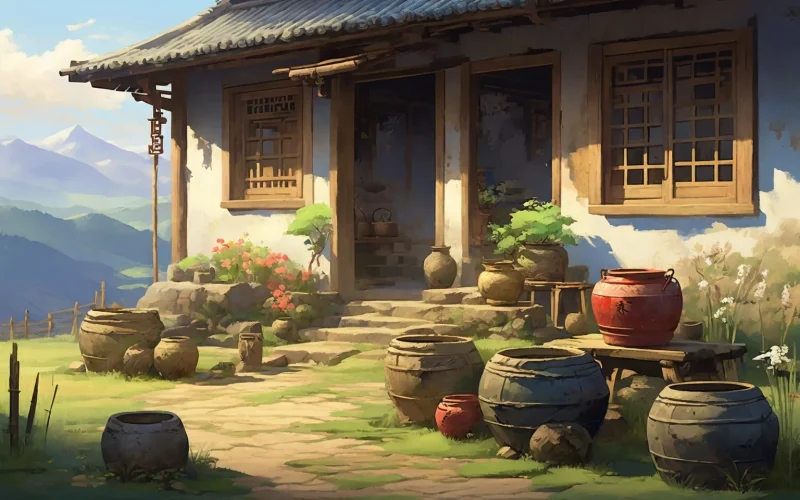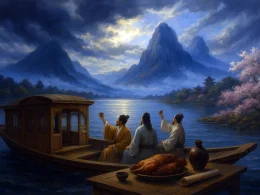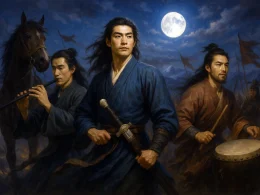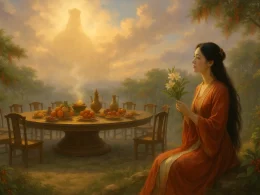The courier road invades the slanting moon,
Frost whitens the stream bridge at break of dawn.
A lone yellow chrysanthemum, frail and wan,
Peeps through the fence—this far mountain pass,
Where I spend my Double Ninth alone, alas!
No dreams visit my traveler’s pillow bare,
Each cold night watch drags slow and wear.
They say the south has scenes so fair—
But my heart yearns for the Central Plain,
And turns these joys to deeper pain.
Original Poem
「南歌子 · 驿路侵斜月」
驿路侵斜月,溪桥度晓霜。
短篱残菊一枝黄。
正是乱山深处、过重阳。旅枕元无梦,寒更每自长。
吕本中
只言江左好风光。
不道中原归思、转凄凉。
Interpretation
This lyric was composed in the early Southern Song period, shortly after the fall of the Northern Song dynasty. Having fled south with the imperial court, Lü Benzhong found himself in Jiangnan—a region renowned for its scenic beauty—yet his heart remained tethered to the lost Central Plains. Written during the Double Ninth Festival (重阳节), a traditional occasion for family reunions and mountain outings, the poem juxtaposes the solitary journey through remote mountains with profound national and personal grief. Through stark imagery and layered emotions, Lü transforms a personal moment into a collective lament for a fractured homeland.
Upper Stanza: "驿路侵斜月,溪桥度晓霜。短篱残菊一枝黄。正是乱山深处、过重阳。"
Yì lù qīn xié yuè, xī qiáo dù xiǎo shuāng. Duǎn lí cán jú yī zhī huáng. Zhèng shì luàn shān shēn chù, guò Chóngyáng.
The post road fades under a waning moon,
frost coats the stream-crossing bridge at dawn.
Behind a low fence—one last yellow chrysanthemum.
Here, in these chaotic mountains’ depths,
I pass the Double Ninth alone.
The stanza opens with a predawn journey, where the "waning moon" (斜月) and "frost" (晓霜) evoke both physical chill and emotional desolation. The "post road" (驿路), typically a symbol of imperial connectivity, now underscores displacement. The solitary chrysanthemum (残菊)—a traditional Double Ninth symbol—stands as a fragile relic of celebration amidst ruin. The final line’s "chaotic mountains" (乱山) resonate beyond topography, mirroring the dynasty’s collapse and the poet’s inner turmoil.
Lower Stanza: "旅枕元无梦,寒更每自长。只言江左好风光。不道中原归思、转凄凉。"
Lǚ zhěn yuán wú mèng, hán gēng měi zì cháng. Zhǐ yán Jiāngzuǒ hǎo fēngguāng. Bù dào Zhōngyuán guī sī, zhuǎn qīliáng.
On this traveler’s pillow, dreams refuse to come;
each cold nightwatch stretches endlessly.
They say the left riverlands boast peerless views—
never mentioning how thoughts of the Central Plains
shiver into sorrow.
Transitioning to nocturnal reflection, the stanza exposes the exile’s psychological torment. "Dreams refuse to come" (无梦) suggests relentless wakefulness, while "cold nightwatch" (寒更) personifies time as a sentinel of suffering. The juxtaposition of Jiangnan’s "peerless views" (好风光) with the "Central Plains" (中原) highlights the cruel irony of exile: beauty intensifies, rather than alleviates, homesickness. The verb "shiver" (转) masterfully captures how longing metastasizes into despair.
Holistic Appreciation
The ci poem begins with scenes from a journey, transitioning from scenery to emotion. The first stanza depicts dawn travels and Double Ninth Festival sights, while the second shifts from the solitude of night lodging to the anguish of being unable to return to the Central Plains. Though framed as a travel poem, it carries the weight of lost nationhood and unfulfilled homecoming.
Through cold imagery—slanting moon, morning frost, withered chrysanthemums, jagged mountains—the poet constructs an atmosphere of desolate loneliness. Inner emotions deepen layer by layer: triggered by seasonal festivals, frustrated by sleepless nights, and tormented by unreachable homelands. Profound yet restrained, sorrowful yet uncomplaining, the poem balances vivid imagery with philosophical depth.
Artistic Features
- Emotion Embodied in Scenery
Instead of direct lament, feelings surface through desolate images—slanting moon, frost, fading chrysanthemums—achieving seamless scene-sentiment fusion. - Seasonal Catalyst for Emotional Progression
The Double Ninth Festival pivots the mood, linking travel weariness to national loss—advancing from missing family to longing for homeland and mourning a fallen nation. - Precise Allusions, Profound Meaning
Contrasting "scenic beauty south of the Yangtze" with "homesickness for the Central Plains turns bleak" captures the inner conflict of exile—a hallmark of Southern Song scholars’ melancholy. - Tight Structure, Simple Words Deep Feelings
Though compact, the poem flows methodically. Restrained emotion and understated diction form Lü Benzhong’s signature style: "simple words, profound meaning."
Insights
This ci reveals that truly moving works need not shout their pain. Through seasonal markers, natural imagery, and travel motifs, Lü Benzhong expresses deep emotion with delicate precision. His Southern Song Lyrics wield fresh brushstrokes to paint heavy sorrow—not only reflecting exiled scholars’ nostalgia for the Central Plains but also conveying a cultural spirit of "staying rooted in one’s origins."
Today, we still resonate with its themes of homeland, family, and cultural belonging, understanding that spiritual fracture of "body in the south, heart in the north"—and the quiet resilience it demands.
About the Poet
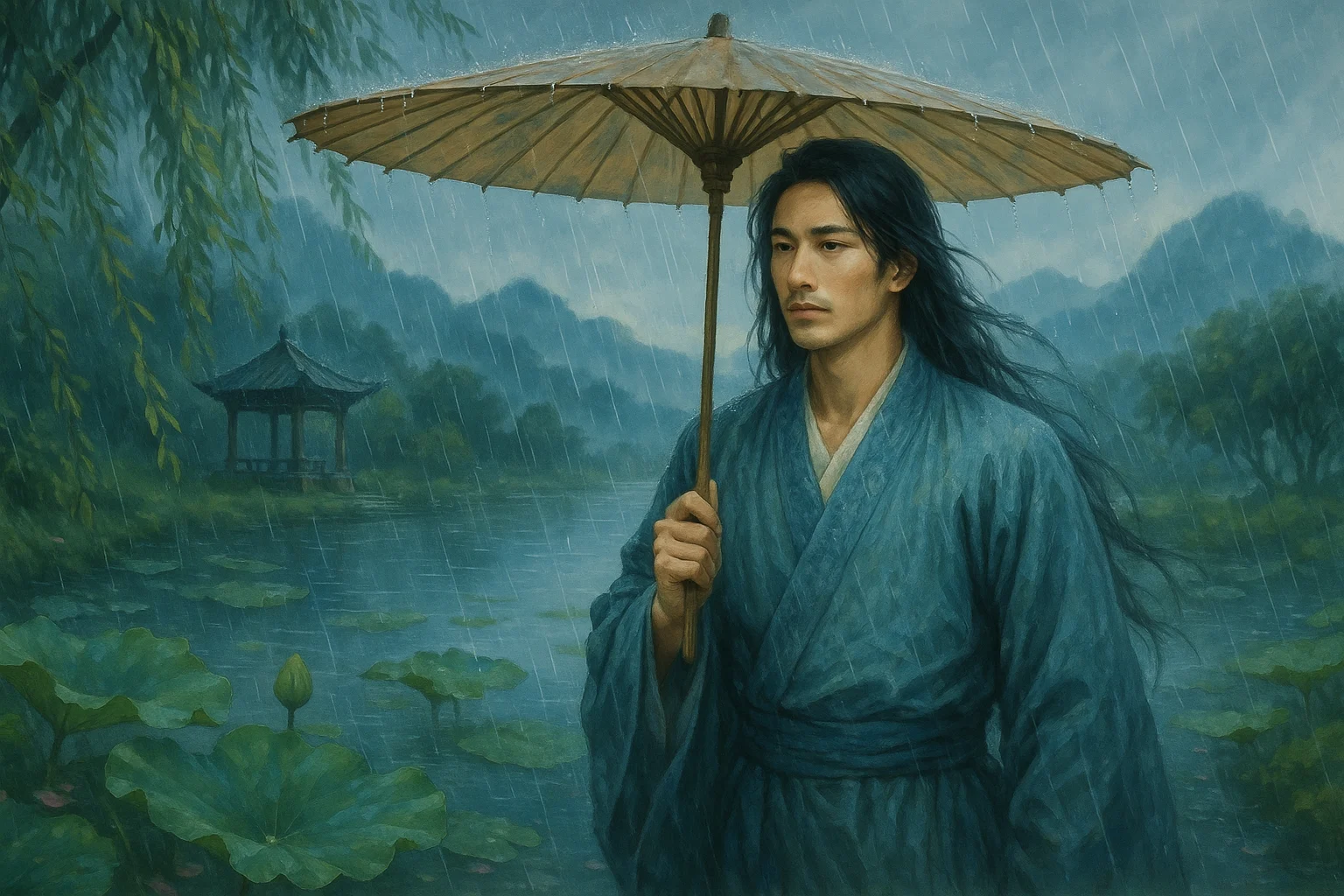
Lü Benzhong (吕本中 1084 - 1145), a native of Shouxian in Anhui, was a renowned poet and Neo-Confucian scholar of the Southern Song Dynasty. As a key theorist of the Jiangxi Poetry School, he proposed the concept of "living method" (huofa), advocating for natural variation within established poetic rules. With over 1,270 surviving poems, his Genealogy of the Jiangxi Poetry School (Jiangxi Shishe Zongpai Tu) established Huang Tingjian as the school's patriarch, profoundly influencing Song poetic theory and serving as a bridge between the Jiangxi School and the Four Masters of the Mid-Song Revival.







